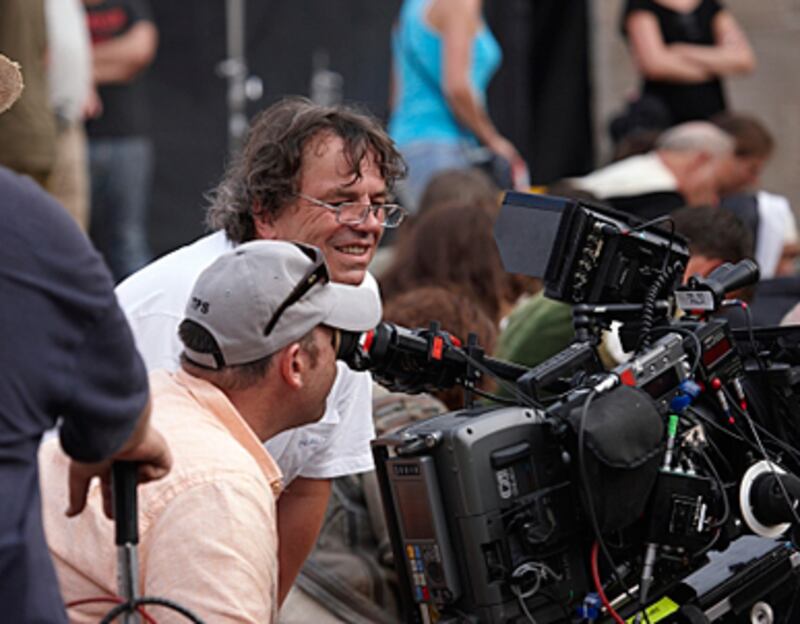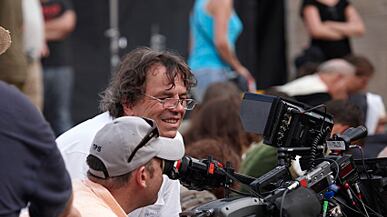As it heads into the final episode of its first season Sunday, already renewed for Season 2, The Borgias has indeed done something new under the sun.
It's doubtful that a more lavishly produced, carefully written, and utterly foreign series has ever succeeded this well with American audiences. What is there to compare it to? Initially commissioned by Showtime as a replacement for The Tudors, The Borgias has outstripped it in just about every sense, including ratings. Particularly impressive when one considers that unlike The Tudors, the characters of The Borgias don't have a ready-made audience built up from scores of young-adult books.
Historically, The Borgias leaves The Tudors in its dust. According to executive producer James Flynn (who was also a producer of The Tudors), "All of the main characters existed, including Cardinal Orsini [a treacherous master of intrigue played Derek Jacobi, who is poisoned in the first episode], Savonarola [the fundamentalist fanatic played with scary intensity by Steven Birkoff], and, of course, all the Borgia family."
"We were very aware," Flynn told me via email, "of the backdrop of actual historical events from the outset, such as Pope Innocent's death, Rodrigo Borgia's election victory, and the French king's invasion of Italy with his terrifying modern cannon." The show's creator, Neil Jordan, adds that "Obviously, some dramatic license was taken throughout as we studied each character's journey."
Give or take a lie or two—and surely no series about the Borgias would be complete without a few lies as florid as the family that inspired them—the show has done a remarkable job of staying within the context of the known historical record. This is more than can be said for most depictions of the Borgias over the last two centuries, from Donizetti's 1833 opera, Lucrezia Borgia, based on Victor Hugo's stage play, Raphael Sabatini's potboiler, The Life of Cesare Borgia (1912), and Henry King's 1949 film, Prince of Foxes, starring a sly Orson Welles as Cesare.
Rodrigo Borgia and his illegitimate children, Cesare, Juan, and Lucrezia, were at the center of a heady swirl of wealth and political power in Rome at the end of the 15th century. In 1492, Rodrigo bribed 17 of 22 cardinals to vote him into the papacy and became Pope Alexander IV. He placed his oldest son in a key position as a capo among the College of Cardinals, put his other son in charge of the papal armies, and used his beautiful daughter as a political bargaining chip. In the words of one historian, Alexander became, "The first great capitalist of the faith, the first pope to make all spiritual wares commodities in the worldly market place." Wealth, religion, and political power were, for the first time, wielded by one house, and in the wake of the family's rise to power, massive corruption, sexual scandal, and murder became as common traits of the Renaissance as literature, art and architecture.

The story of the Borgias is the story of Renaissance Italy, which is the story of how the modern world came into being. Banking and finance, political science, big religion, and even weapons of mass destruction—nearly all of what we have come to regard as aspects, good and bad, of the modern world—were born and nurtured in late 15th- and early 16th-century Italy. The Borgias assumes that if its audience isn't familiar with the historical background, it is intelligent enough to be curious.
The Borgias is one of the first television series to send viewers scrambling to websites to find its literary sources. Flynn informs me they were "Christopher Hibbert's hugely entertaining The Borgias and Their Enemies, Sarah Bradford's wonderful biographies of Cesare and Lucrezia Borgia, and Alexander Dumas' The Crimes of the Borgias, which preserved some of the juiciest gossip. And, of course, Machiavelli's The Prince."
I'd also give odds that Jordan dipped into A History of the Borgias (1901), a colorful collection of facts and nonsense by Frederick Baron Corvo, a.k.a. Frederick William Rolfe, the English writer and eccentric. "The Borgian era," reads the dust jacket to my father's old copy, "with all its excesses of lust and murder, its monstrous villainies, and strange benevolences, is here unfolded in a tapestry of unrestrained color and animation." And just think, we're only in the first season.
All three of the main characters—Jeremy Irons as Rodrigo/Alexander, French-Canadian Francois Arnaud as Cesare, and English actress Holliday Grainger as Lucrezia—are works in progress. Irons, gaunt, gray and handsome, looks nothing like the Alexander VI we see in period portraits; the Spaniard was a thick-set man with heavy nose and features. Irons was worried about this, but it was of no concern at all to Jordan, who told him, "No one's going to judge the authenticity of what you do by a 400-year-old painting." What was important, Jordan told Irons, was to convey the man's cunning intelligence and steely resolve.
If there’s a dramatic weakness to the Borgias’ story, it’s that it can’t be tragic in the classical sense because the characters have no souls left to lose.
After the opening episode, in which Alexander sometimes seems astonished by his own transition to power, Irons settles in to the part with a relish he hasn't displayed since his Oscar-winning performance as Claus Von Bulow in Reversal of Fortune.
Arnaud has the strong, firmly cut features and brooding eyes of the real Cesare. ("This Lord," wrote Machiavelli, "is truly splendid and magnificent.") His Cesare is at first reluctant to go about his father's business—I'd call him the Renaissance Michael Corleone. As the series moves along and his father transfers more power to his favorite son, Arnaud's face, at once rueful and sinister, seems to become darker.
The real revelation, though, is the mellifluously named Holliday Grainger. If there's a dramatic weakness to the Borgias' story, it's that it can't be tragic in the classical sense because the characters have no souls left to lose. But The Borgias does have one tragic figure in Lucrezia. Modern historians have freed Alexander's daughter from her popular but mistaken image as a poisoner and bedsheet diplomat. This was a woman to whom the normally acid-penned poet Ariosto wrote tributes. Grainger plays her with an engaging mixture of sweetness and street smarts, and what looks like a glittering box of candy turns out to have guts and brains. The lady, in the face of a near apocalyptic invasion by the French army, which threatens to depose her father and brothers, has scenes of genuine heroism.
Not surprisingly, Jordan, who directed the first two episodes, scripted the first seven, and prepared an outline for the final two, doesn't see his characters as monsters. "Rodrigo truly believed as pope that it was his sacred duty to strengthen the church. To me, that's what's most fascinating about these people—their piety was real."
The Borgias is a glittering red jewel in Jordan's amazing career. His name most quickly conjures up his popular hits such as Interview With the Vampire (1994) and The Crying Game (1992), for which he won an Academy Award for Best Screenplay. But his real depth as an artist has been revealed in an amazing number of great personal films—the haunting and playful The Company of Wolves (1984), a fairy tale co-written with the late Angela Carter; the extraordinary Mona Lisa (1986), with Bob Hoskins, a film whose multi-layered nuances are still being plumbed; his literary adaptations of Patrick McCabe's novel The Butcher Boy (1997) and Graham Green's The End of the Affair (1999); and even his epic of Irish history, Michael Collins (1996), which was uneven but laced with moments of terrible beauty. The lovely fable-like Ondine (2009) with Colin Farrell almost seems like a movie made to be discovered by a small audience and then passed from soul to soul. No one else makes movies like this.
And no one makes television like The Borgias. What extraordinary luck that Jordan's original intent, to make it into a feature-length screen epic, became a series for cable television, allowing for the scope of the story to be both deepened and expanded. With luck, The Borgias will be with us for the next few years.
Allen Barra writes about sports for The Wall Street Journal and The Village Voice. He also writes about books for Salon.com, Bookforum, and The Washington Post. His latest book is Yogi Berra, Eternal Yankee.






